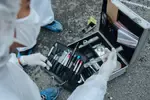Welcome To The All About Forensic Science Website
This website was launched on the 10th January 2007 and is designed to help anybody looking for informed and detailed information on this fascinating topic. Definitions, history, topic areas, theory and practice, careers, debates, CSI, degree and study options will all be covered in detail here.
It was a result of my research activity that I ended up pursuing an interest in forensics. In 2000 I was involved in collaborative research with teams of forensic odontologists (dentists) in the UK, US and Canada.
Forensic odontologists carry out body identification work from dental remains at accident and crime scenes, and at mass casualty sites. For instance in the aftermath of a plane crash and at The World Trade Center post 9/11. The research we conducted was primarily to examine the emotional and psychological impact of this kind of work. We also explored the forensic implications of biting behavior within the context on a criminal investigation; given that bitemarks are often found on the victims of violent and sexual crime.
I sincerely hope that you find the website useful and engaging.
David Webb BSc (Hons), MSc

Take the GED Online at Excel High School
Useful Defintions
Forensic science is the application of natural sciences to matters of the law. In practice, it draws upon physics, chemistry, biology, and other scientific principles and methods and is concerned with the recognition, identification, individualization, and evaluation of physical evidence. Forensic scientists present their findings as expert witnesses in the court of law.
(Midwest Forensics Resource Center at the U.S. Dept. of Energy)
The word "forensic" means "pertaining to the law;" forensic science resolves legal issues by applying scientific principles to them.
(Hall Dillon, Bureau of Labor Statistics)
Forensic Science is the application of the methods and techniques of the basic sciences to legal issues. Crime Laboratory Scientists, sometimes called Forensic Scientists or, more properly, Criminalists, work with physical evidence collected at scenes of crimes.
(California Criminalistics Institute)
Forensic science is the scientific analysis and documentation of evidence suitable for legal proceedings. Many people have heard the term "forensics" used to describe school debate clubs. There is a similarity between these two forms of the word. In academic forensics, political or other issues are debated between two teams using a logical approach, and likewise in forensic science the debate (or comparison) is between the physical evidence and the known or suspected circumstances about an event.
Forensic scientists determine scientific facts from the evidence they evaluate and may testify as expert witnesses in civil or criminal courts or other legal proceedings. It is the responsibility of the lawyers, judges, and juries to prosecute, defend, and judge the guilt or innocence of an individual accused of wrongdoing. It is the responsibility of the forensic scientist to present the scientific facts in a fair, objective manner based on accepted scientific methods to facilitate the decision.
(Hamilton County Forensic Center)
What Topic Interests You The Most?
Recent Articles
-
All About Forensic Science
Nov 12, 24 03:05 AM
A forensic science website designed to help anybody looking for detailed information and resources. -
The Role of Forensic Evidence in Criminal Defense Cases
Sep 05, 24 03:38 AM
Article exploring five key roles that forensic evidence plays in criminal defense cases -
The Evolving Role of Medical Science in Forensic Investigations
Aug 06, 24 03:35 AM
Insightful article exploring the critical role of medical science in forensic investigations.
The All-About-Forensic-Science.Com website does not sell any personal information. (See privacy policy.)


New! Comments
Have your say about what you just read! Leave me a comment in the box below.